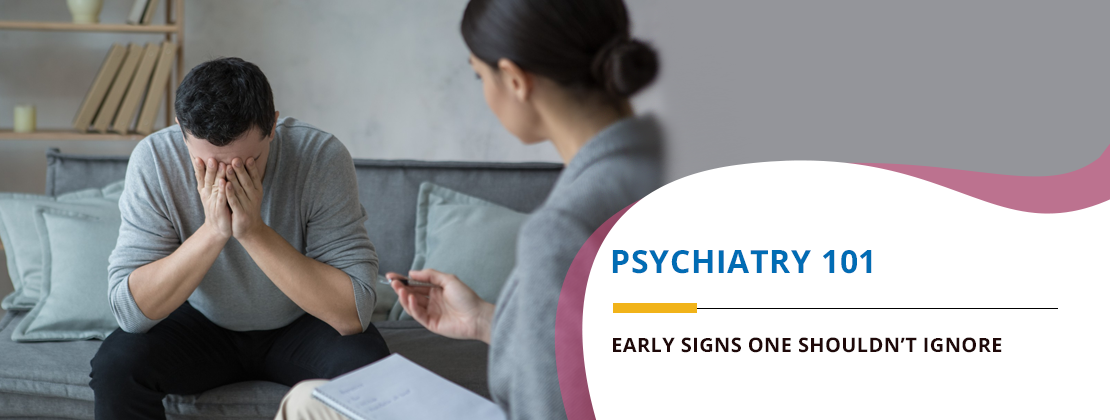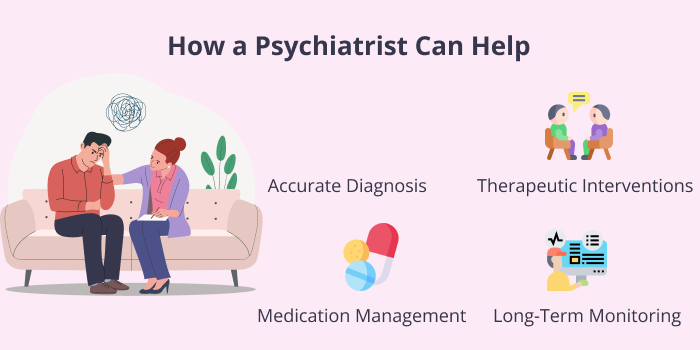
Home / Blog / Psychiatry 101: Early Signs One Shouldn’t Ignore
May 5, 2025
Every individual experiences emotions such as joy, anger, sadness, and anxiety, but when these emotions become overwhelming or interfere with daily life, it may point to deeper mental health concerns.
The current generation of adults, especially the younger population, faces a high risk of experiencing emotional strain due to factors such as demanding work life, exposure to digital media, and difficulties in interacting with others.
Early diagnosis is not just important; it is imperative.
By prioritising early intervention, it is possible to transform lives for individuals dealing with emotional distress and break the cycle of psychological suffering.

Psychiatry is a branch of medicine focused on the diagnosis and treatment of mental, emotional, and behavioural disorders.
A psychiatrist is trained to understand how various influencing factors like genetics, work, trauma, peer pressure, and lifestyle habits work together to influence an individual’s mental health.
Common psychiatric conditions that demand prompt medical attention include:
In recent years, we have seen a significant spike in autism and ADHD diagnoses among adults due to increased awareness, a growing understanding of the factors contributing to these conditions, and the availability of better diagnostic tools.
These conditions often manifest in subtle ways. Hence, understanding their signs is the first step toward early intervention and healing.
As per the Indian Ministry Of Health And Family Welfare, the lifetime prevalence of mental health issues among Indians stands at 13.7%. Nearly 15% of the Indian population have mental health issues that require mental interventions.
Mental health issues are more common in the urban regions of the country (13.5%) when compared to the rural regions (6.9%).
About 70-92% of individuals with mental health issues do not receive necessary treatment and care for various reasons, including the stigma, a lack of awareness, and a shortage of psychiatrists.

Early identification of symptoms can greatly enhance results. Here are eight indicators of potential psychological disorders that require immediate action:
Individuals with certain mental health issues experience extreme worry, fear, or distress over simple things. It is important to pay attention to these signs for timely intervention.
Not wanting to be with friends or family, saying no to joining social events, or staying alone may indicate social phobia or depression. This withdrawal may be silent but is often a powerful indicator of emotional distress.
Humans, irrespective of age, need adequate sleep for proper growth and development. If they are unable to sleep, have bad dreams, or sleep too much, it may indicate serious psychological problems such as anxiety and depression.
Occasional change of mood may be common; however, extreme irritability, aggressive behaviour, or extended sadness are warning signs. These could be signs of bipolar disorder or other psychiatric conditions.
If a previously motivated individual starts underperforming, avoids tasks, or loses interest in work altogether, it could stem from difficulty concentrating, often seen in ADHD or depression.
Chronic headaches, stomach aches, or unexplained fatigue can sometimes be physical expressions of emotional distress. This often occurs when mental distress is ignored for a prolonged period.
Noticeable weight changes, obsession with body image, or erratic eating behaviours could be signs of eating disorders, often coexisting with other psychological disorders.
Even if it’s mentioned jokingly, any talk about self-harm, death, or worthlessness is a serious red flag. Immediate help from an experienced psychiatrist is essential.
These behaviours may seem isolated, but together, they may be indicative of mental health challenges. Identifying such signs of anxiety or mental distress at an early stage empowers one to act before the condition escalates.
Some individuals may fail to identify or acknowledge the emotional distress they are facing. There is a good chance that they may also ignore it, assuming it to be caused by their busy lifestyle.
Here’s a simple guideline on when one should seek psychological assistance for themselves. Should any conduct continue for over a month and affect work, social life, or day-to-day activities, then it is advisable to seek expert advice.
There is no shame in acknowledging one’s own mental health issue. One gets clarity and relief by seeking the help of professionals at the top psychiatric hospitals in India, such as HCG Hospitals, where there is a dedicated department for psychiatry, which is equipped to offer precise diagnosis and a customised treatment plan for various psychiatric disorders.

A psychiatrist possesses specialised knowledge in diagnosing various mental issues, treating them, and restoring the quality of life for patients.
Psychiatrists determine the root causes of emotional or behavioural changes through behavioural assessments, standardised tests, and interviews. These could be linked to family dynamics, work stress, or underlying neurological issues.
Individuals can better understand and control their emotions when they receive a combination of therapies, such as cognitive-behavioural therapy (CBT).
Additional Reading: Cognitive Behavioural Therapy (CBT): How It Works and Who It Helps | HCG Hospitals
When therapy alone isn’t enough, medications like antidepressants or stimulants are prescribed to manage symptoms effectively, particularly in conditions like ADHD, anxiety, or mood disorders.
Mental health is a journey, not a one-time fix. Follow-ups ensure that the treatment is working and that any new issues are promptly addressed.
At HCG Hospitals, one of the best psychiatric hospitals in India, the expert team ensures that individuals get the support they need across all domains of life—home, work, and social circles.
A large percentage of Indians fail to receive timely diagnosis and care for their mental health issues. This leads to reduced productivity at the workplace, hampered day-to-day activities, and, worse, a poor quality of life.
Delaying seeking professional assistance, ignoring symptoms of anxiety or distress, or believing they will “just get better” can have long-term effects. On the other hand, a competent psychiatrist’s early diagnosis and treatment can greatly enhance the quality of life and general well-being.
In today’s fast-paced and often overwhelming world, taking care of your mental health is just as important as your physical health. Early attention truly can make all the difference.